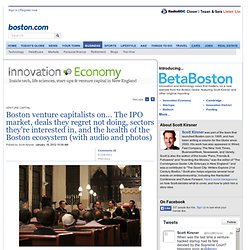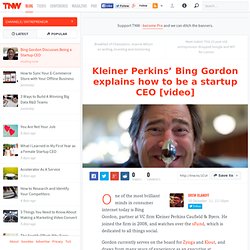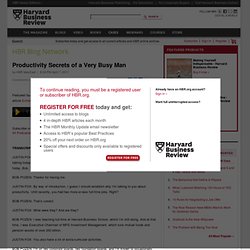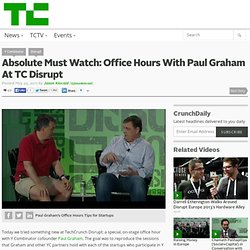

Venture capitalists on... The IPO market, deals they regret not doing, sectors they're interested in, and the health of the Boston ecosystem (with audio and photos) - Innovation Economy. By Scott Kirsner, Globe Columnist I moderated a panel of venture capitalists last night at the historic Vilna Shul on Beacon Hill, talking about what mattered most in tech and VC last year, and what they expect to see in 2012.

I'm posting the audio below; it runs for about an hour. The quality is good, though audience questions are tough to hear. The speakers started off in this order: Fred Destin of Atlas Venture, Jonathan Seelig from GlobeSpan Capital Partners, Rob Go from NextView, and Jo Tango from Kepha Partners. Among the questions I asked: What was your most successful investment, and what was a deal you didn't do and lived to regret? The audience asked about the way the structure of VC firms might change... the attitude toward investing in consumer Internet companies in Boston... whether angel groups are passé...and the Stop Online Privacy Act. Emerging Technologies Conference at MIT. Paul Graham Office Hours at Startup School 2011. Bing Gordon Discusses Being a Startup CEO. 10 December '11, 11:16pm Follow One of the most brilliant minds in consumer internet today is Bing Gordon, partner at VC firm Kleiner Perkins Caufield & Byers.

He joined the firm in 2008, and watches over the sFund, which is dedicated to all things social. Gordon currently serves on the board for Zynga and Klout, and draws from many years of experience as an executive at Electronic Arts (EA). He was the driving force behind the branding of EA Sports, which is arguably the company’s best known brand. In the video below, Bing Gordon discusses his thoughts on how to be a CEO in the era of the “consumer internet”, which is a completely different era than the first big Dot Com boom. Listen and learn. Rethinking Capitalism - Video. Creating Shared Value. The capitalist system is under siege.

In recent years business increasingly has been viewed as a major cause of social, environmental, and economic problems. Companies are widely perceived to be prospering at the expense of the broader community. Even worse, the more business has begun to embrace corporate responsibility, the more it has been blamed for society’s failures. The legitimacy of business has fallen to levels not seen in recent history. This diminished trust in business leads political leaders to set policies that undermine competitiveness and sap economic growth. A big part of the problem lies with companies themselves, which remain trapped in an outdated approach to value creation that has emerged over the past few decades.
Companies must take the lead in bringing business and society back together. The solution lies in the principle of shared value, which involves creating economic value in a way that also creates value for society by addressing its needs and challenges. Productivity Secrets of a Very Busy Man - HBR IdeaCast. Featured Guest: Bob Pozen, senior lecturer at Harvard Business School and author of the HBR article Extreme Productivity.

Download this podcast JUSTIN FOX: Welcome to the HBR IdeaCast from Harvard Business Review. I’m Justin Fox. I’m talking today about personal productivity with Bob Pozen. Thanks for taking the time to join us today, Bob. BOB POZEN: Thanks for having me. JUSTIN FOX: By way of introduction, I guess I should establish why I’m talking to you about productivity. BOB POZEN: That’s correct. JUSTIN FOX: What were they? BOB POZEN: I was teaching full-time at Harvard Business School, which I’m still doing. JUSTIN FOX: You also have a lot of extra-curricular activities. BOB POZEN: I’m on two corporate boards, two foundation boards, and I’m known to occasionally write an article.
JUSTIN FOX: And some of those articles are for HBR and hbr.org. BOB POZEN: Probably the most important overriding principle is that you have to be focused on results, not on time spent. That was Bob Pozen. Absolute Must Watch: Office Hours With Paul Graham At TC Disrupt. Today we tried something new at TechCrunch Disrupt: a special, on-stage office hour with Y Combinator cofounder Paul Graham.

The goal was to reproduce the sessions that Graham and other YC partners hold with each of the startups who participate in Y Combinator — except the startups at Disrupt were getting sage advice in front of a few thousand people. And boy, was it awesome. Six companies were chosen at random from the TechCrunch Disrupt Startup Battlefield. Then, for six sessions of less than ten minutes each, Graham spoke with each startup founder to flesh out their idea, asking probing questions as he tried to figure out what they were setting out to do, and what they might need to change. Graham has a knack for being insightful and critical on his feet, and he doesn’t require much background information to hone in on some of the pain points and weaknesses in a startup’s idea (it’s a skill that likely comes from practice, as he’s held office hours with hundreds of YC companies). Hatcher Gallery Recordings Recordings. Hatcher Gallery Recordings Recordings.
The Internet Economy: Globalizatin in the Information Age.